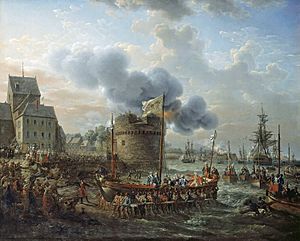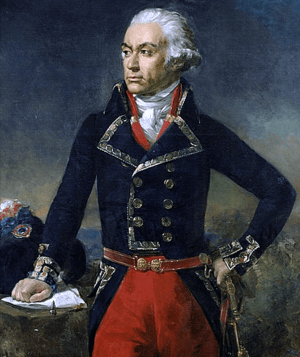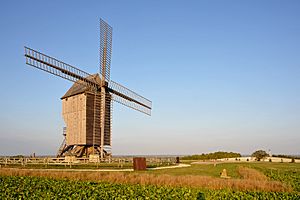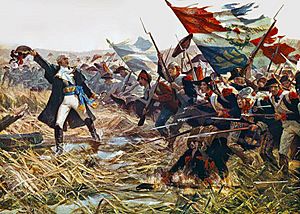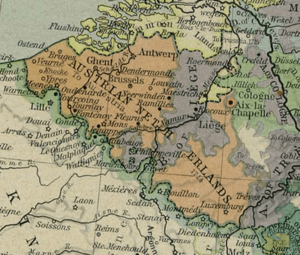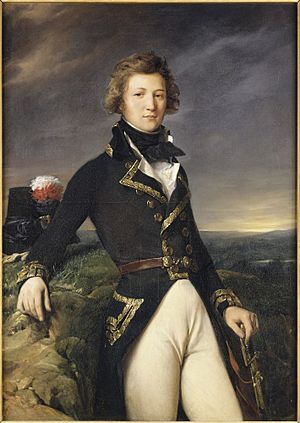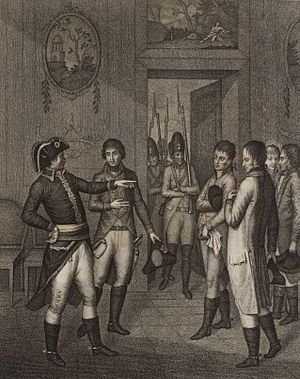Charles François Dumouriez facts for kids
Quick facts for kids
Charles François Dumouriez
|
|
|---|---|
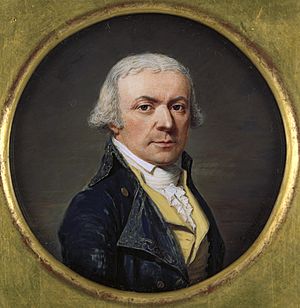
Portrait miniature by de:Pierre-Louis Bouvier, 1796/7
|
|
| Born | 26 January 1739 Cambrai, Kingdom of France |
| Died | 14 March 1823 (aged 84) Turville, United Kingdom |
| Buried | |
| Allegiance | |
| Service/ |
|
| Years of service | 1758–1814 |
| Rank | Divisional general |
| Battles/wars | Seven Years' War French conquest of Corsica War of the Bar Confederation
|
| Awards | Order of Saint Louis Names inscribed under the Arc de Triomphe |
| Other work | Minister of War, Minister of Foreign Affairs (France) |
| Signature | |
Charles-François du Périer Dumouriez (born January 26, 1739 – died March 14, 1823) was a French military leader. He also served as a government minister during the French Revolution. He was the Minister of Foreign Affairs and later the Minister of War.
Dumouriez was a general in the French Revolutionary Wars. He helped France win its first big victory at the Battle of Valmy. There, the Prussian army had to retreat. He also led French armies into what is now Belgium. However, he later disagreed with the new French government. After losing a key battle, he left the French army. He refused to face a special court that might have executed him. Instead, he joined the Austrian army, becoming a traitor to France.
Contents
Early Life and Military Start
Dumouriez was born in Cambrai, a city in northern France. His family was of noble rank. His father, Antoine-François du Périer, was an official in the royal army. He made sure his son received a good education. Charles-François studied in Paris at a famous school called the Lycée Louis-le-Grand.
In 1757, Dumouriez began his military career as a volunteer. He fought in six campaigns during the Seven Years' War. He was a junior officer in the Régiment d'Escars. He was stationed in cities like Emden and Münster. He even carried a small library with him. He was promoted for his bravery in battle. He received 22 wounds during the Battle of Corbach. In 1761, he recovered from his injuries. After the war ended, he retired as a captain. He received a special award called the Order of Saint Louis.
Adventures and Secret Missions
After retiring, Dumouriez traveled to Italy, Spain, and Corsica. He wrote reports to a powerful French minister about Corsica. This led to him being called back to the army. He became a lieutenant-colonel and joined the French forces sent to Corsica.
In 1769, Dumouriez became a deputy quartermaster general. He then joined the Secret du Roi. This was a secret spy group working for King Louis XV. This job allowed him to use his skills in dealing with other countries. When the minister he worked for lost power, Dumouriez was called back.
In 1770, he went on a secret mission to Poland. There, he helped organize a Polish army for the Bar Confederation. This group was fighting for Poland's freedom. His Polish soldiers were defeated by Russian forces in the Battle of Lanckorona.
Imprisonment and New Beginnings
In 1772, Dumouriez returned to Paris. He got a job writing reports for the army. In 1773, he was arrested in Hamburg. He was then put in the Bastille prison for six months. This happened because he supposedly used money meant for secret agents to pay his own debts. While in prison, he spent his time reading and writing.
He was later moved to Caen and stayed there until Louis XVI became king in 1774. Dumouriez was then released and given new jobs in Lille and Boulogne-sur-Mer.
After his release, Dumouriez married his cousin, Mademoiselle de Broissy. He also started focusing on improving France. He sent many ideas to the government. One of his ideas was about defending Normandy and the Cherbourg navy port. This led to him becoming the commandant of Cherbourg in 1778.
He managed Cherbourg very well for over ten years. New fortifications and dikes were built. The city grew, and even the King came to see the improvements. For his clever work in fortifying the area, he became a maréchal de camp in 1788. After the Storming of the Bastille in 1789, he became commander of the National Guard. However, he wanted more power. He and his wife separated, and she went to live in a convent.
Political Career
When the French Revolution began, Dumouriez saw a chance for a new career. He went to Paris and joined the Jacobin Club. In 1790, he became a military advisor to the new United Belgium States. He wanted Belgium to be an independent republic.
In 1791, he was promoted to major-general. He offered to help the National Assembly after the royal family tried to escape.
Becoming a Minister
Dumouriez then joined the Girondist political group. On March 15, 1792, he became the French Minister of Foreign Affairs. He chose Pierre Henri Hélène Marie Lebrun-Tondu to help him with Belgian affairs. Dumouriez and the Girondists worked together for practical reasons. Dumouriez needed support in the government, and the Girondists needed a general to give them power in the army.
He played a big part in France declaring war on Austria on April 20. He ordered French troops to invade the Austrian Netherlands. His foreign policy was influenced by Jean-Louis Favier, who wanted France to break ties with Austria.
When King Louis XVI fired some ministers, Dumouriez took over as Minister of War. But he resigned a few days later. This was because the King refused to agree with the National Assembly. Within a week, Dumouriez joined the Army of the North. After the King was overthrown on August 10, 1792, Dumouriez became the commander of the "Army of the Centre." At this time, France's enemies were attacking. Dumouriez acted quickly.
On August 24, 1792, Dumouriez wrote to his ally General François Kellermann. He said that General Lafayette was a "traitor" for trying to protect the royal family. Dumouriez showed his loyalty to the French military. This helped him become Foreign Minister. He helped France defend its borders. He outsmarted the invading forces in the forest of Argonne. His subordinate, Kellermann, pushed back the Prussians at Valmy on September 20, 1792. After these victories, Dumouriez was ready to invade Belgium. He wanted to spread the revolution there.
Army of the North
With support from Minister Lebrun-Tondu, Dumouriez told the National Convention on October 12 that he would free the people of Belgium. On October 27, 1792, he invaded the Austrian Netherlands. Dumouriez severely defeated the Austrians at Jemappes on November 6, 1792. He became a military hero for this important victory. Newspapers called him the liberator of the Belgians.
He arrived in Brussels on November 14. He met with Dutch revolutionary patriots. However, the French government was running out of money. Dumouriez wrote a letter to the Convention. He complained that his army was not getting enough supplies. He also criticized a new law that allowed French armies to take goods from conquered areas. This law also introduced paper money called assignats, which caused inflation. This law made it harder to get support from the Belgian people.
Dumouriez wanted to create an independent Belgian state. This state would be free from Austrian control. It would also act as a buffer between France and its eastern neighbors. This would not worry the British. To do this, he started talking with local leaders in Belgium. But on December 15, the Convention passed a law. This law ordered military commanders in occupied areas to put all revolutionary laws into effect.
War with the Dutch Republic
Dumouriez returned to Paris on January 1, 1793. People cheered for him, but the revolutionary government was less supportive. On January 12, he met with Lebrun-Tondu. On January 23, he was sent back to the front. The Dutch were willing to pay, so an invasion of the Netherlands was delayed.
Some radical people in Paris thought Dumouriez was not a true patriot. They believed he tried to save King Louis XVI from execution. On January 29, Dumouriez lost his power to negotiate. With help from the Girondists, Dumouriez made sure that the War Minister, Pache, had to resign. This happened at a very important time in the war.
On February 1, France declared war on the King of Great Britain and the leader of the Dutch Republic. The next day, Francisco de Miranda, a general from Latin America, gave command of the French forces back to Dumouriez. Dumouriez wanted the government to recognize Belgium's independence. But the Jacobins sent agents to Belgium. On February 7, Dumouriez liked the secret offers from the Dutch and British. They offered to recognize the French Republic if France stopped attacking other countries.
On February 15, Johan Valckenaer asked the Convention to give Dumouriez all power to remove and restore leaders. Lazare Carnot suggested that France should take over territories even if the people there didn't want it. On February 17, 1793, French troops crossed the Dutch border. They occupied cities like Breda and Geertruidenberg. These French soldiers were called Sans-Culottes and lacked many supplies.
After the French lost cities like Venlo and Maastricht in early March, Dumouriez was ordered to return to Brussels. He was told not to go further into Holland. The situation was worrying. Miranda wrote to Dumouriez, telling him to continue his plan and not return to Belgium.
On March 11, Dumouriez spoke to the Brussels assembly. He apologized for the actions of French officials and looting soldiers. On March 12, Dumouriez wrote an angry letter. It was seen as a "declaration of war on the Convention." He criticized the War Ministry, which had many Jacobin members. He attacked Pache, Marat, and Robespierre. Meanwhile, Danton started the Revolutionary Tribunal to question generals. Dumouriez had long disagreed with the Convention's direction. He was unhappy with how radical the revolution was becoming. He stopped trying to take over more land. The people of Belgium liked him.
On March 18, 1793, Dumouriez's army attacked the Austrian army. This was led by Archduke Charles. The French suffered a major defeat in the Battle of Neerwinden. This almost ended the French invasion. On March 20, Danton and Charles-François Delacroix were sent to Louvain. On March 22, Dumouriez began talks with Austrian General Mack. Mack allowed Dumouriez to retreat to Brussels. Many of Dumouriez's soldiers were leaving the army. The next day, Dumouriez promised the Austrians he would leave Belgium. He did this without permission from the Convention.
Dumouriez had long disagreed with the Convention. He did not want the Dutch Republic to be controlled by France. He believed his army had freed southern Netherlands, and he would not let it fall to the Convention's officials. On March 25, Dumouriez asked General Mack for support to march on Paris. He wanted to negotiate peace, end the Convention, bring back the French Constitution of 1791, and restore a constitutional monarchy. He also wanted to free Marie-Antoinette and her children. He urged Louis Philippe I (then a teenager) to join his plan. The Jacobin leaders were sure that Dumouriez was planning a military takeover.
Dumouriez's Defection
On March 25, Robespierre joined the Committee of General Defence. This committee was created to manage the war. By the end of the month, Robespierre called for Dumouriez to be removed. He believed Dumouriez wanted to become a dictator in Belgium. Four officials were sent to question and arrest him. These officials were Camus, Bancal-des-Issarts, Quinette, and Lamarque. They were joined by the Minister of War, Pierre Riel de Beurnonville.
Dumouriez suspected a trap. He invited them to his headquarters at Saint-Amand-les-Eaux. He ordered his officer, Miaczinski, to arrest them. After an hour of discussion, Dumouriez refused to go with them to Lille and Paris. Instead, he arrested the five officials. He sent them to the Austrian General Clerfayt the next day.
Robespierre was convinced that Brissot and Dumouriez wanted to overthrow the First French Republic. On April 3, Robespierre told the Convention that the entire war was a plan by Dumouriez and Brissot to overthrow the Republic.
On April 4, the Convention declared Dumouriez a traitor. They offered a reward for his capture. Davout's volunteer soldiers tried to arrest Dumouriez. Dumouriez tried to convince Davout to join him, but failed. He tried to get his own troops to march on Paris and overthrow the government. But many of his soldiers were loyal to the Republic, and some officers opposed him.
Without an escort, he rode on horseback to Tournai. He was with his chief of staff and the Duke of Chartres. On April 5, 1793, he arrived at the Austrian camp at Maulde. This event weakened the Girondists because of their connection to Dumouriez. Dumouriez's defection changed everything for them. On April 6, the Committee of Public Safety was created. Suspicion grew against Philippe Égalité because his eldest son had fled with Dumouriez. Philippe Égalité was then watched closely.
In Brussels, Dumouriez met with Metternich and received a passport for Germany. On April 10, Robespierre accused him in a speech. He said Dumouriez had harmed France by stopping the use of French paper money in Belgium.
The French armies took positions along the border. The Army of Holland was near Lille. The Army of the Ardennes was at Maulde. The Army of the North was at Saint-Amand. The Army of Belgium was at Condé-sur-l'Escaut and Valenciennes.
Later Life and Death
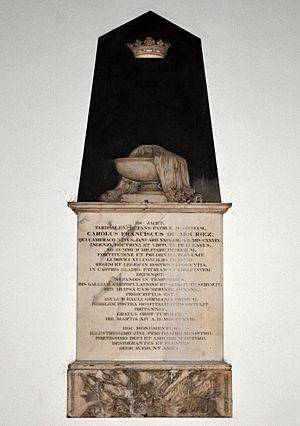
After leaving France on April 5, 1793, Dumouriez stayed in Brussels for a short time. Then he traveled to Cologne, hoping to find a job at the elector's court. He soon realized that people across Europe, including royal families and nobles, viewed him with suspicion. In response, Dumouriez wrote and published a book of his memories in Hamburg in 1794. In it, he shared his side of the story about the events of the previous year.
He became involved in royalist plots during the time of Napoleon. He also advised the British government. Dumouriez's name is one of those carved on the Arc de Triomphe in Paris.
Dumouriez traveled from country to country, always involved in royalist plans. In 1804, he settled in England. The British government gave him a pension. He became a valuable advisor to the British War Office. He helped the Duke of York and Albany in the fight against Napoleon. How much he helped only became known many years later. Dumouriez wrote many political papers analyzing Napoleon's military campaigns.
In 1814 and 1815, he tried to get King Louis XVIII to make him a marshal of France, but he failed. He died at Turville Park, near Henley-on-Thames, on March 14, 1823. A larger edition of his memories, La Vie et les mémoires du Général Dumouriez, was published in Paris in 1823.
Sources
- Patricia Chastain Howe (2008) Foreign Policy and the French Revolution. Charles- François Dumouriez, Pierre LeBrun, and the Belgian Plan, 1789–1793
- J.M. Thompson (1929) Leaders of the French Revolution: Dumouriez, p. 200-216
| Political offices | ||
|---|---|---|
| Preceded by Claude Antoine de Valdec de Lessart |
Minister of Foreign Affairs 12/15 March 1792 – 12 June 1792 |
Succeeded by Pierre-Paul de Méredieu |
| Preceded by Joseph Marie Servan de Gerbey |
Secretaries of State for War 13 June 1792 – 18 June 1792 |
Succeeded by Pierre August Lajard |
See also
 In Spanish: Carlos Francisco Dumouriez para niños
In Spanish: Carlos Francisco Dumouriez para niños
 | Toni Morrison |
 | Barack Obama |
 | Martin Luther King Jr. |
 | Ralph Bunche |


